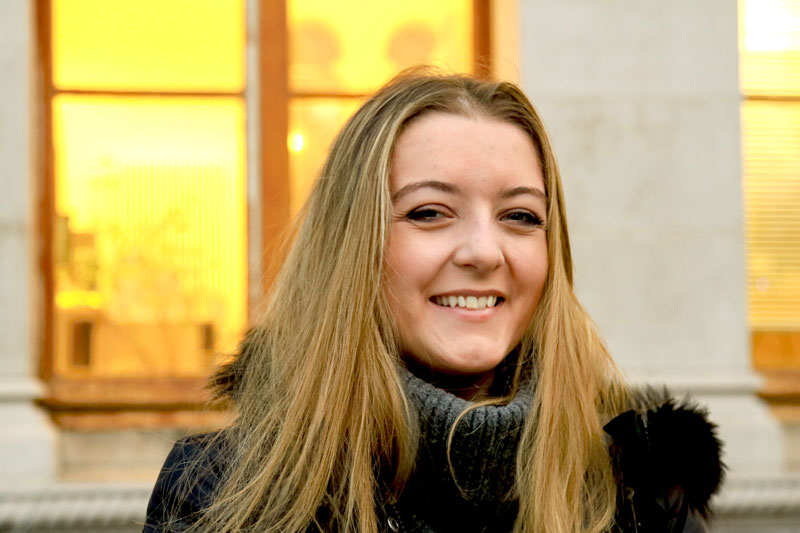
Susannah Hunt, a fourth-year film studies student in Trinity, may only be in the formative stages of what she hopes will be a fruitful and bright career in the world of film, but she has already had more than a taste of the sweetness that success in the industry brings. In 2016, Hunt’s comical, yet emotional, short film “Colin the Pantomime Horse”, which details the quest of a neglected pantomime horse for acceptance and a place in which he truly belongs, handed the budding director and producer a place in the live final of Shorts TV’s pitching competition at the Cannes Film Festival.
On top of this, Hunt has been lucky enough to have gained valuable experience working with a number of other talented, ambitious filmmakers on various projects including the upcoming Image Nation which was filmed in LA and directed by Hunt – a film that delivers a devastating, black social commentary on the narcissism and excesses of modern society. Hunt has also interned as an assistant both for Heyday Films and for American actor Ed Helms of The Office and The Hangover fame.
Speaking to The University Times, Hunt gave her insights on a wide range of issues from the importance of being a risk-taker in the film industry and making your own luck, to her plans for vivifying DU Film Society and the intricacies of the work that goes on behind the scenes on the majority of productions. Hunt also took this as a chance to offer some words of advice to other aspiring filmmakers eager to carve out a future of their own in the film industry.
Recollecting the aftermath of her appearance at Cannes in the live final of The Pitch, Hunt remembers the serendipitous events that led to “Colin the Pantomime Horse” actually being commissioned: “My friend and I were sitting at a dinner table afterwards. We had had a lot to drink and were talking quite loudly about the film, when a man sitting next to us turned to me and said ‘Oh, I’ve heard about this, give me your pitch’. So, I gave him my spiel, and he said ‘How much do you need to make the film?’ So I told him ‘10 grand’ and, miraculously, he agreed. He invested in the film. He’s given me money to make other films since then too.”
This anecdote underscores the reality that an enterprising filmmaker’s destiny is never fixed – opportunity can come knocking at any moment, ready or not. Through making her own luck and being at the right place at the right time, Hunt has managed to greatly increase the volume of artistic possibilities available to her. Moreover, Hunt has justified the faith put in her to create projects of her own by proving extremely capable of actualising those possibilities, converting them into an oeuvre of film that illustrates her aptitude for directing, screenwriting and producing.
Hunt also intends to imbue Trinity’s film society with a new spirit of dynamism, having taken over as head of productions for the current year. She says “there will be three short film productions taking place over the course of the year. I think people often underestimate how much effort goes into making a short film. For example, I’m coordinating groups of 30 plus people just to make one thing happen”. Hunt is also quick to defend film students in response to accusations that they are not as well equipped as students from other disciplines to take on leadership roles. “Many business students don’t even have that experience of managing such large groups of people. Film students are often dismissed as being second-rate when, in fact, they actually have a much more hands-on knowledge of what is required in organising people and raising money for projects.” Listening to this unvarnished, intimate account of the toil that goes into bringing a quality production to life reveals the level of judgement and conscientiousness that those, like Hunt, are expected to possess. These are expectations that many would feel burdened with and daunted by, yet Hunt seems to relish the immense responsibility that goes hand in hand with overseeing productions of this kind.
Concluding the interview, Hunt is solemn in passing on the best guidance she can to those out there who may be uncertain of how to catch a break in the film industry. She says: “Practice, practice, practice. There’s no way in hell you’re going to know what anyone is talking about if you aren’t spending every possible opportunity you have on set, writing, watching films, thinking about films.” Her uncompromising belief in filmmaking being nothing less than an all-consuming mission is again hinted at here: “It has to be an obsession. You have to live, breathe, eat film and make sure it’s your number one priority in everything you do. The other thing I would say is don’t take no for an answer. If you believe in yourself, then other people will start to believe in you too.” Given the palpable enthusiasm, passion and hunger that is present in Hunt’s every utterance, it is abundantly clear that she is not someone who fails to practice what she preaches.






